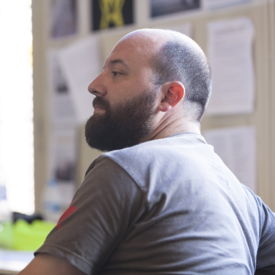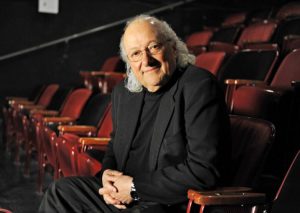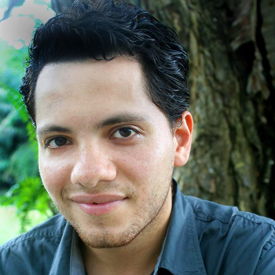Playwriting / Composing Interviews
Playwright Chronicles: A Day in the Life
Alexandra Appleton | November 02, 2018
Writing is such a personal, individual process and our writers each offer a unique insight into their own methods and creative outlook on an average day. Do they put pen to paper, or go straight to the computer? Do they need structure, or does a free, thought-flowing environment work best? Let’s find out!
This week, we sat down to chat with Juan Ramirez Jr., Gloria Schramm, Tom Attea, Con Chapman, and Hank Willenbrink.
First up, we asked the million dollar question: on average, how many hours a day do you write? For Boston playwright, Con Chapman, his schedule plays a necessary role in the writing process.

I try to use periods during the day when I know I probably won’t be busy with work—the first hour after I get in at 7:30, or later at night, after dinner, when the tasks of the day will, for the most part, be done. I used to be able to write (by hand, not computer) on the train coming home from work, but I find I’m too tired for that anymore!
Likewise, Tom Attea also finds a creative balance in his working day.
During the workweek, I usually write for the theater about half a day, because I have to reserve the afternoons for writing that, as the phrase goes, “supports the creative habit.” When I’m writing a play or libretto, I do try to reserve the weekends for the work.
Getting the creative juices flowing is clearly a stimulating and reflective activity, and this affects the way, and the pace with which our playwrights approach sitting down to write.

I don’t always write but I do keep a journal and frequently jot down ideas on paper at hand. I complete dialogs and develop titles. The ideas ferment like wine! My pace is right for me. (Gloria Schramm)
When I can [write], I will. I typically let an idea cook in my mind for a bit before I must let it out. I don’t think you necessarily have to write everyday, and that’s coming from someone who if I’m not writing a play, it’s a TV pilot, or a film, or a short, or a monologue, or a web series, or a song, etc, etc, so on and so forth. [Juan Ramirez Jr.]

Anthony Nielson told me once that he believed that there were only 4 good hours in a day. I agree with that mostly. An exceptional day is 3 to 4 hours of generative stuff and then maybe an hour or two of editing (exceptional, because I can pull myself away from the day-to-day to have time to work that much). But, I’d say I’d average 10 to 12 hours a week of creative work, which is pretty good. I’d say that I also try to spend at least an hour or two reading. That’s a really important part of writing for me. [Hank Willenbrink]
The production of a new play or musical is as much thinking as it is writing, and both Tom Attea and Juan Ramirez Jr. offered interesting insights into the cognitive process of writing.

When people talk about writing as difficult, they’re talking about an effect. The cause is thinking, dutifully recorded. If I become insecure and try to write before I think clearly, I’m not sure where I’m going or what I want to accomplish. The result is a tangle of words, pages, and edits. On the other hand, if I think clearly, “I want to go to the store and buy an apple,” it’s quite easy to type up.
When I get an inspiration for a new play or libretto, I start to think about it. It’s as if a piece of a puzzle has fallen off the unseen shelf of my imagination and landed in my lap. The more I think, the more pieces I see fall into place. When I see enough of them to be able to imagine the rest pretty clearly, I decide if the project has social value. If it does, I pretty much just type it up. Since I type fast – a bit to the consternation of the girls, I was the fastest typist in my high school typing class – I can usually go from start to finish on a play within a month and within two months for a libretto, one month for the play and one month for the lyrics. [Tom Attea]

My writing process depends solely on the project itself. It may help that I write out what I can for a story and then for others, it may be something that I take the time for some deeper thinking. I’ve currently had in my head this sci-fi film idea and wondering if the technology would ever exist. After about a year of it still being in my mind, I come to find out that this technology is possible and experts are working on it. So now I wait longer to learn more. Life’s funny. [Juan Ramirez Jr.]
But do the playwrights prefer typing straight on to the computer, or is the traditional pen and paper the preferred route? Juan Ramirez Jr. suggests that it depends on what part of the writing process the playwright is engaged in.
I freehand my outlines as it’s easier to cross out and pour everything out at once. Typing at this point is too slow. Then when it’s time to write the play, I type it. Some playwrights still write it out on paper to allow uninterrupted writing as typing on a computer lends itself to seeking perfection and making edits at the moment, which, again, interrupts the free flow writing. For me it’s better that I type at this point because I like to see the play in specific moments and as a whole.
Finally, we wondered whether the playwrights have a specific audience in mind when they sit down to write? If so, what form does this theoretical audience take? All of the writers agreed that engagement and connection are their fundamental motivators when envisaging the audience they are writing for.
Charles Friedman once said, “You decide what to write by the audience you want to reach.” I want to reach an educated audience, so I write for the medium most likely to attract one. I like Somerset Maugham’s description of the writing style, in his autobiography, The Summing Up, as “intelligent entertainment.” [Tom Attea]
Playwrights (and writers or all genres) hope for audience or reader connection. They want the audience to come away with something from their plays. For me, it was obvious that this had happened, when two audience members came to seek me out after Letting Go was finished and told me that they no longer felt alone in dysfunctional family interactions. Many others told me they could identify with at least one aspect of divorce in the family, as acted out in my play. [Gloria Schramm]
Juan Ramirez Jr. fundamentally agrees with the idea of connection, and believes that a well-written character should have a profound effect on the audience.
I guess you can say that when I’m writing a protagonist, I want them to be impacted by the character’s journey and flaws. Depending on what that flaw is, I want to speak to people like them. Although, I want everyone to see the story because anyone can be impacted by a story. I truly believe that. It doesn’t matter if my play stars a middle aged Latina who makes coquito with her self-stored discontinued Bacardi 151 and a pound of family love all the while having to deal with the dysfunction of her family because you too can take a piece of the story for yourself. The more specific a character is, the more work the audience does to connect to them. I don’t write for those that want to be entertained but for those that want to experience.
Many thanks once again to our playwrights for a fascinating peek into the everyday life of a writer! Next time, we will be discussing how the writers go about researching a new show, and the different ways in which their characters develop within this process. Stay tuned!
Last Updated: August 21, 2023
Writer, editor and theatre researcher
